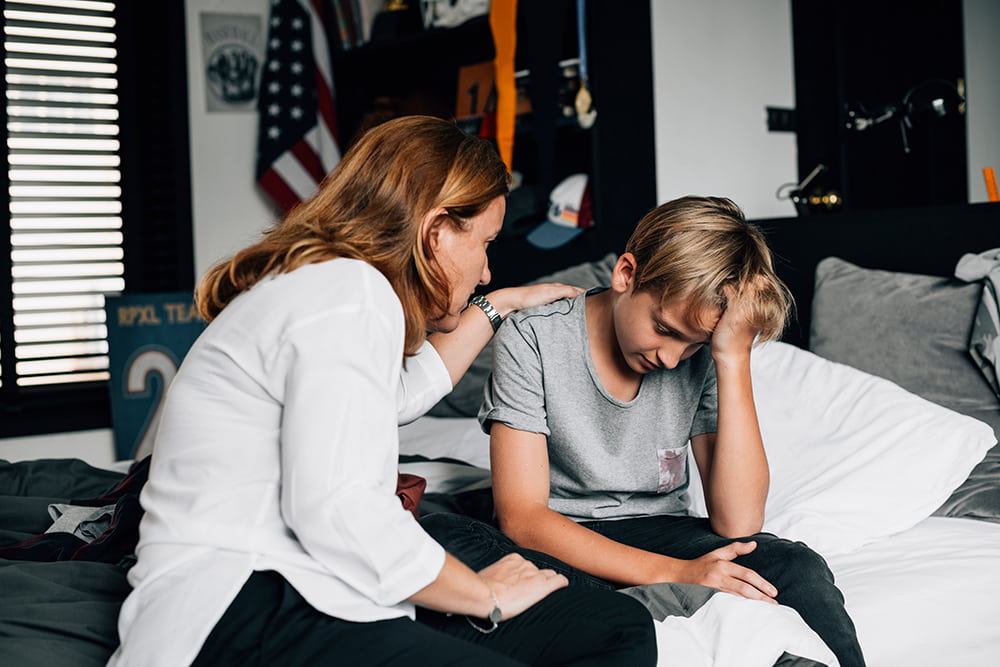Growing up I was close to my mom. She was and still is my best friend. I could talk to her about anything. I felt comfortable going to her for advice. Now that I have children, I have strived to have continuous open conversations with them.
The Need to Be More Empathetic
However, I realized that I was becoming the parent that gave hugs but not advice. Recently, Cohen came home from a friend’s house abruptly. I could tell something was wrong and I went to chat with him. I found myself comforting him but asked him if he wanted to talk to his dad instead of me. In those situations, I never know what to say and I am scared to say the wrong thing. When my child is truly in distress because they feel hurt, disappointed, worried or angry, they desperately need their parent. I am glad he feels comfortable with Mitch but I need to strive to do better. Maybe it’s because I don’t want to see them feeling negatively, so my first instinct is to tell them not to feel the way they do. I suck at empathy. I give hugs and kiss boo-boos but I realized that if I don’t show empathy this results in my child feeling ashamed of how they feel, compounding the hurt.
Moreover, the knowledge that their mom does not try to understand them. I don’t want them to feel alone. Basically, this teaches them that opening up, to me, about how they feel makes them feel worse. And this is something, I fear and do not want! It doesn’t help that my husband just got his master’s in counseling, so I know he is more knowledgeable and gives better advice.
During their chats, I try to occupy our daughter. My husband always fills me in on the situation, but I want Cohen to feel comfortable talking with me. In essence, the sympathy requires no emotional investment on my part because I become the powerful saver and rescuer, which makes me feel better but not Cohen. It is the easy way out. So, I have work to do. I am not an empathic person but I need to do better for my kids so they can talk to me.
Examples of How to Honor Feelings
That’s when I hit the google button and asked for examples of what I should say to honor his feelings instead of dismissing them. A few examples below:
- That’s a big worry. I get it.
- You are upset. I would be too.
- You have every right to feel disappointed. I felt like that when I was your age.
- You are mad. I understand. You have every right.
- It hurts to see someone do something you want to be able to do but can’t yet.
- You are mad. I’m sure you have a good reason. I want to hear about it.
So, when either of my children are hurting, I am going to try and give them a solid dose of empathy, so they feel understood and connected to me. When Mitch does this, they immediately feel better and they want his help in problem-solving. In many cases, the empathy is all they need to feel better. Simply knowing we understand allows them to feel secure and forge ahead.
Having an empathic response requires me to shift from how I feel about the situation to how my child feels. It’s me remembering how it feels to be the worst one at something or picked on so I can relate to my child. It’s selfless and it puts my child first, emotionally. Empathy creates a rugged work ethic and resilience. Hopefully, my children will learn empathy through their father, and now my ways, and will thrive on adversity instead of breaking down when negative things happen.
For now, I plan to continue to work on having empathy so I can stay close to my children. I need to remember to empathize is to empower, so the reward will be priceless.

Mallory Connelly
Babies & Toddlers
In addition to the time I devote to being a mom, I also work full-time outside the home, which means my day is hardly ever as simple as nine to five. With an all-too-established schedule, as soon as I walk through the door, my day doesn’t end, but rather just begins. It’s a balancing act, especially with two children, but being a mom is one full-time job that I never want to quit!









